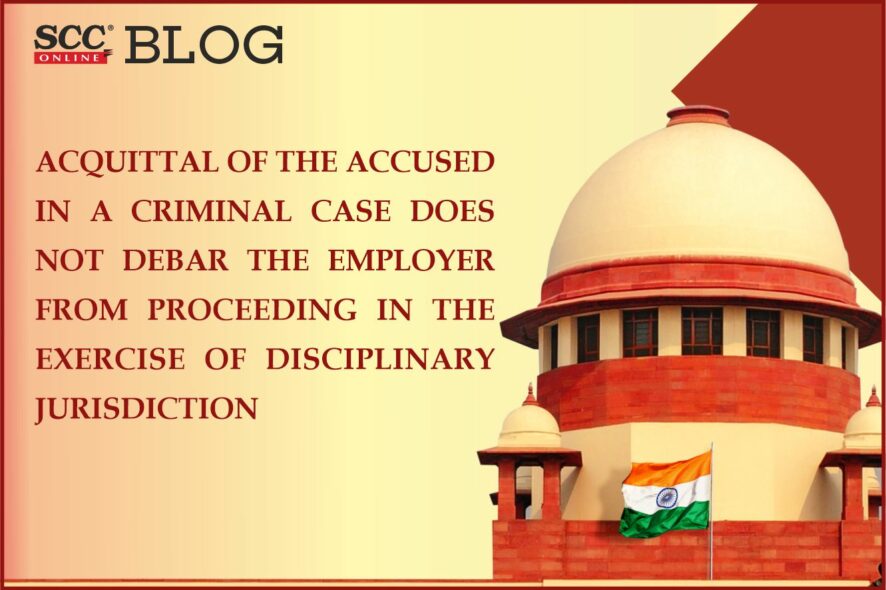Supreme Court: In a case where the Karnataka High Court had reversed the judgment of Karnataka Administrative Tribunal directing compulsory retirement of a Government Servant after being found guilty of bribery, the bench of Dr. DY Chandrachud* and Surya Kant, JJ has held that acquittal of a person in the course of the criminal trial does not impinge upon the authority of the disciplinary authority or the finding of misconduct in the disciplinary proceeding.
Factual Background
- The respondent, working as a Village Accountant at Revathagao in Indi Taluka of Bijapur District in Karnataka, was charged for demanding a bribe for deleting the name of a person from Column No. 11 of the RTC with regard to land bearing Survey No. 54, situated at Shirdona Village.
- A criminal complaint was registered with the Lokayukta police against the respondent for the commission of an offence punishable under Sections 7 and 13(1) (d) read with Section 13 (2) of the Prevention of Corruption Act 1988.
- After the investigation, a charge sheet was submitted against the respondent by the Lokayukta police in Special Case No. 20 of 2011 in the Court of Special Judge at Bijapur, who gave the benefit of doubt to the respondent and acquitted him of all charges.
- A disciplinary enquiry was initiated under Section 7(2) of the Karnataka Lokayukta Act 1984 and the Lokayukta held that the charge against the respondent was proved and recommended the penalty of compulsory retirement from service.
- The disciplinary authority held that the misconduct was proved and imposed a penalty of compulsory retirement.
- Aggrieved by the penalty, the respondent moved the Karnataka Administrative Tribunal. The Tribunal upheld the order of compulsory retirement.
- The Karnataka High Court set aside the judgment of the Tribunal.
Disciplinary enquiry vis-à-vis Criminal Trial
The principles which govern a disciplinary enquiry are distinct from those which apply to a criminal trial. In a prosecution for an offence punishable under the criminal law, the burden lies on the prosecution to establish the ingredients of the offence beyond reasonable doubt. The accused is entitled to a presumption of innocence. The purpose of a disciplinary proceeding by an employer is to enquire into an allegation of misconduct by an employee which results in a violation of the service rules governing the relationship of employment. Unlike a criminal prosecution where the charge has to be established beyond reasonable doubt, in a disciplinary proceeding, a charge of misconduct has to be established on a preponderance of probabilities. The rules of evidence which apply to a criminal trial are distinct from those which govern a disciplinary enquiry. The acquittal of the accused in a criminal case does not debar the employer from proceeding in the exercise of disciplinary jurisdiction.
Scope of Judicial Review
In the exercise of judicial review, the Court does not act as an appellate forum over the findings of the disciplinary authority. The court does not re-appreciate the evidence on the basis of which the finding of misconduct has been arrived at in the course of a disciplinary enquiry. The Court in the exercise of judicial review must restrict its review to determine whether:
- the rules of natural justice have been complied with;
- the finding of misconduct is based on some evidence;
- the statutory rules governing the conduct of the disciplinary enquiry have been observed; and
- whether the findings of the disciplinary authority suffer from perversity; and (vi) the penalty is disproportionate to the proven misconduct.
Ruling
The Court observed that none of the above tests for attracting the interference of the High Court were attracted in the present case. The Karnataka Administrative Tribunal having exercised the power of judicial review found no reason to interfere with the award of punishment of compulsory retirement. The Division Bench of the High Court exceeded its jurisdiction under Article 226 and trenched upon a domain which falls within the disciplinary jurisdiction of the employer. The enquiry was conducted in accordance with the principles of natural justice. The findings of the inquiry officer and the disciplinary authority were held to be sustainable with reference to the evidence which was adduced during the enquiry. Hence, the acquittal of the respondent in the course of the criminal trial did not impinge upon the authority of the disciplinary authority or the finding of misconduct in the disciplinary proceeding.
[State of Karnataka v. Umesh, 2022 SCC OnLine SC 345, decided on 22.03.2022]
*Judgment by: Justice Dr. DY Chandrachud
Counsels
For appellant: Advocate V N Raghupathy
For Respondent: Advocate Ashwin V Kotemath







